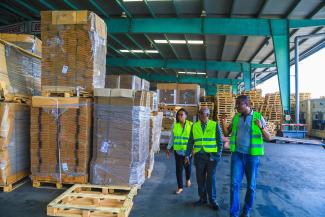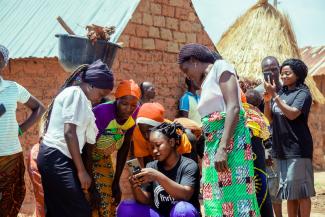As West Africa’s population booms and its economy continues to expand, the opportunities for businesses to trade across the region are vast. Despite this, economic growth rates in most of the countries are lagging and poverty remains high. Essentially, West Africa’s farmers and firms produce and trade in highly localized markets and do not achieve the sufficient economies of scale required to attract broad-based investments that could accelerate growth and reduce poverty. This is due to a number of constraints including inefficient transportation and trade barriers along corridors and at borders, a heavy reliance on family and informal sources of financing, and an insufficient supply of reliable and affordable power. These factors result in West African products being uncompetitive in the international market place.
USAID/West Africa’s strategy is to work through regional organizations and private sector associations to address critical constraints to competitiveness and demonstrate West Africa’s productive potential in order to trigger greater regional investment.
TRADE FACILITATION WEST AFRICA (TFWA)
West African countries have long-standing, thriving business connections. Over the years, these existing trade relationships have been formalized and enhanced into important cross border trade along key corridors, and serve as the main source of livelihoods for many traders, notably women, transport operators, and businesses connected to trade such as hotels and restaurants.
Unfortunately, West Africa also has some of the longest road transportation times for travel between countries and some of the highest travel costs per kilometer of any region in the world. The region’s corridors are laden with administrative barriers such as cumbersome border and customs clearance processes, as well as formal and informal checkpoints and roadblocks that keep trucks stationary for extended periods of time. These are serious impediments to the region’s economic growth and development. In addition, implementation of trade facilitation related policies such as the Trade Facilitation Agreement (TFA), the adoption and implementation of the ECOWAS Customs Code, and the enforcement of the existing regional measures (like Common External Tariff and ECOWAS Trade Liberalization Scheme) are not yet fully enforced.
In response to these challenges, USAID/West Africa partnered with the Economic Community of West African States (ECOWAS), the West African Economic and Monetary Union (UEMOA), the European Commission (EU), the World Bank (WB), Germany (GTZ) and the Netherlands to develop the Trade Facilitation West Africa (TFWA) program. Since 2018, TFWA has strived to advance ECOWAS’s regional agenda to support the free movement of goods, support countries to implement the World Trade Organization Trade Facilitation Agreement, decrease the time and cost of goods to move along key regional corridors, and increase engagement of the private sector and civil society in trade facilitation reforms, with a particular focus on women and small-scale traders.
WEST AFRICA TRADE and INVESTMENT HUB
West Africa is ripe for doing business. Agriculture is the main economic driver and the region has one of the fastest growing uses of mobile phones and digital technology. Women also play important roles that contribute to economic growth. Harnessing the above factors to catalyze sustainable business ventures will improve the lot of the larger population. A few challenges, however, prevent West African businesses from reaching their full potential. Notable among these are: 1) inadequate access to business friendly financial support mechanisms; 2) modern business development services; 3) networking and linkages to larger markets; 4) enabling policies that foster adequate participation of vulnerable groups.
The West Africa Trade and Investment Hub is a one-stop shop that partners with banks/financial institutions to provide financial support and business development services, capacity building, and best practices with the aim of making businesses viable and export ready, especially for the U.S. markets through the African Growth Opportunity Act (AGOA).
Over a five year period and $140 million worth of funds, the Trade Hub is working with bilateral missions to co-create and co-manage support to various sectors in order to boost trade and exports, create about 6,000 jobs, and empower women economically with a strong gender target of 50 percent women.
CORDAID
The potential for private sector growth in West Africa is enormous. With improving economies and a youthful workforce hungry for success, the stage is set for economic growth. However, access to finance that is competitive and sustainable remains a major setback, and is even more pronounced among the smaller economies.
The CORDAID project is a four year activity led by the West Africa Trade and Investment Hub in partnership with the U.S. International Finance Corporation (DFC) and Stichting Cordaid, managed by Cordaid Investment Management B.V. (CIM), to increase the access to finance for small and medium sized enterprises and microfinance institutions in Burkina Faso, Guinea, Mali and Sierra-Leone. Due to this public-private partnership, this program will generate up to $37 million of new private investments into these countries to support local economies, create over 20,000 direct and indirect jobs, and increase the value of exports over the duration of the activity.
Africa Trade and Investment (ATI)
The USAID Africa Trade and Investment (ATI) program is designed to bolster USAID’s ability to boost trade and investment to, from, and within the African continent. The continent-wide program is USAID’s flagship effort under the Prosper Africa initiative and will expand and accelerate two-way trade and investment between African nations and the United States. The program, which runs through 2026, will generate thousands of jobs across the African continent and within the United States, deliver billions in exports and investments, mobilize private-sector driven solutions, create healthy business environments, and spur economic opportunities for women and youth.

Photo Credit: Blue Skies

Photo credit: Trade Facilitation West Africa Program

Photo credit: Thrive Agric

Photo credit: Cordaid Investment Management (CIM)
